When GameCola is offered a review copy of an upcoming game, it’s typically something like a real-time 3D vegetable simulator that inexplicably won’t run on my NES, or else it’s a game that’s totally up my alley for a system I own, and Michael Gray has already called dibs on it. In the case of Gemini Rue, I happened to be checking my e-mail at the precise instant when the e-mail about the review copy arrived. Shoulda played the lottery that day. In an excited frenzy, I skimmed through just enough of the message to read the words “sci-fi” and “PC game,” and I glossed over a few screenshots resembling the point-and-click adventure game classics of the early ’90s, and then I CALLED DIBS.
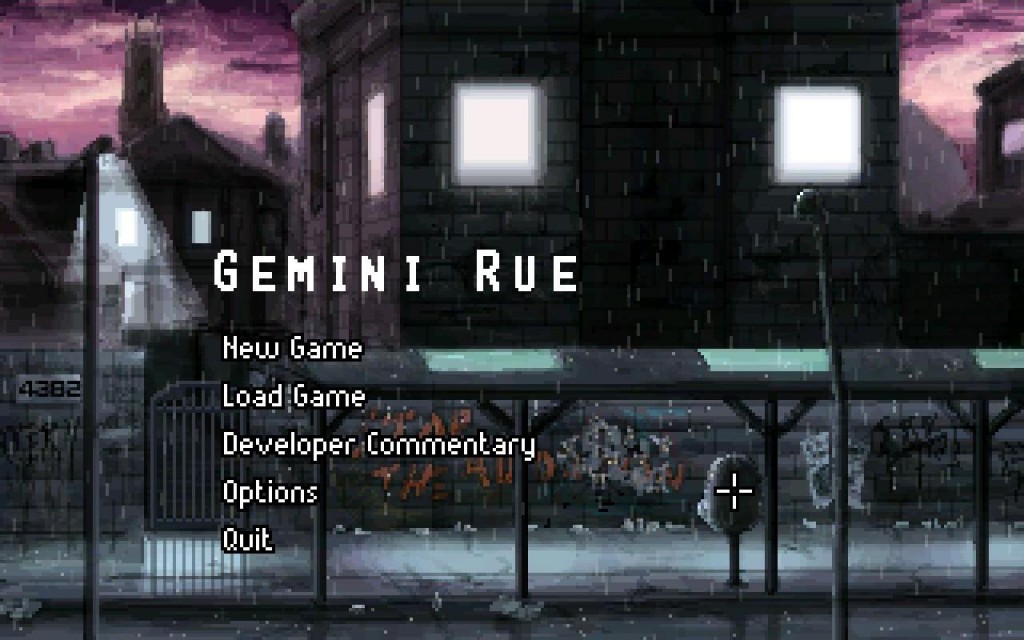 “Load Game.” What will they think of next?
“Load Game.” What will they think of next?
I then proceeded to do no further research whatsoever on Gemini Rue. While I wouldn’t recommend this approach when, say, buying a car or choosing a spouse (GameCola gets offered review copies of those, too), my complete ignorance of what I was about to play had a profound impact on my enjoyment of the game: Up until I realized what was going on, Gemini Rue was the greatest adventure game I had ever played.
There I was, strapped to a chair in some sort of examination room or testing chamber, surrounded by sinister technology and men in lab coats. They called me by name: Delta-Six. With ominous music lurking in the background, the voice-acted scientists began to discuss my situation, hinting at what I had done to wind up here, and making it abundantly clear what was about to happen: In a matter of moments, they were going to erase my memory, destroying everything I had ever been. Clearly, this would not do.
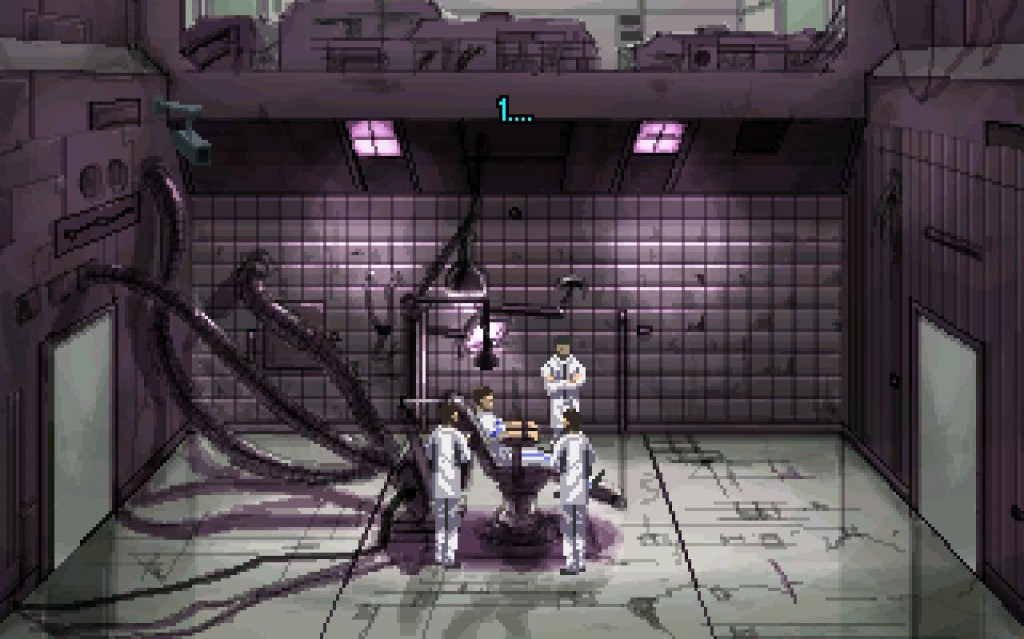 …is the loneliest number that you’ll ever rue. Erm…do.
…is the loneliest number that you’ll ever rue. Erm…do.
As soon as the delicious exposition ended and I was able to interact with my environment, I attempted to wriggle free of my restraints. No luck. A soothing computer voice calmly counted down the seconds before I’d have a legitimate excuse to forget my fiancee’s birthday this year. I quickly examined my surroundings for a clue to my method of escape—nothing. I begged the technicians to let me go. No dice. I screamed toward the door, in the hopes that the Deus Ex Machina waiting outside would take its cue. Still nothing. With just one second left until doomsday, and so many options left to try, I frantically attempted to lick the nearby computer monitor for good luck.
It seemed like a good idea at the time.
But time was up. They pulled the switch. Total memory wipe. Game over.
…
…
…Yet the game went on.
Rain. So much rain. A man in a trenchcoat, standing alone in the worst part of town, miles or even lightyears away from wherever Delta-Six was being held. I was now playing as Azriel Odin, a cop in search of…someone. An umbrella salesman, no doubt. As this new character’s story unfolded, the impact of that first scene stuck with me. I couldn’t help but wonder whether failure was inevitable, or whether there was a way out and I was just a fool who spent his last remembered moment trying to lick a computer screen.
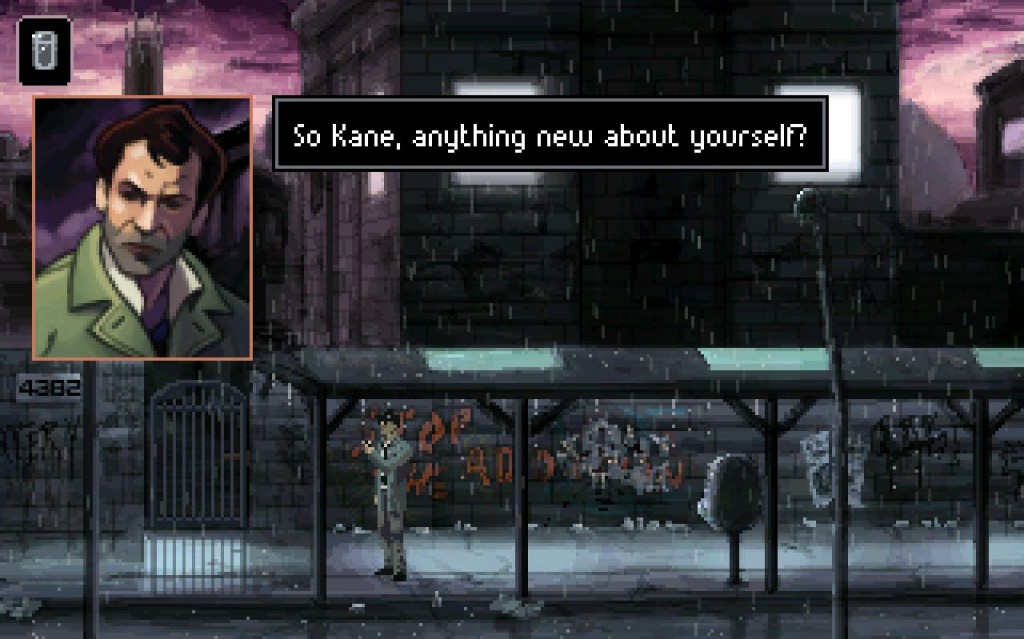 Azriel’s communicator is an incredibly useful tool and a stupidly fun toy. I spent the first five minutes calling up my partner in space to pester him. Amazingly, he didn’t fly the spaceship away and leave me stranded here.
Azriel’s communicator is an incredibly useful tool and a stupidly fun toy. I spent the first five minutes calling up my partner in space to pester him. Amazingly, he didn’t fly the spaceship away and leave me stranded here.
I was in a state of adventure game nirvana like I had never known. Totally absorbed by the narrative, charmed by the convincing and emotive voice actors, curious about the things the game wasn’t yet ready to disclose, drawn in by the impressive hand-drawn backgrounds, eased into the proper mindset by the atmospheric music, free to investigate this gritty neighborhood in any way I saw fit (kicking dumpsters and talking to fire hydrants, mostly)…I was Azriel Odin. Not since Star Wars: Knights of the Old Republic had I felt so completely immersed in a story-driven game…and knowing virtually nothing about Gemini Rue, I began to assume that this game would be just as sprawling and open-ended as SW:KotOR.
Like assuming the toy surprise at the bottom of your favorite cereal box will be a yacht.
For the entire first quarter of the game, there were no indications to the contrary—though the main story gives you just enough information to send you on your way, there’s more than enough history and backstory available from computer terminals and dialogue options to suggest that the Gemini Rue universe is at least as huge and complex as, say, Rhode Island.
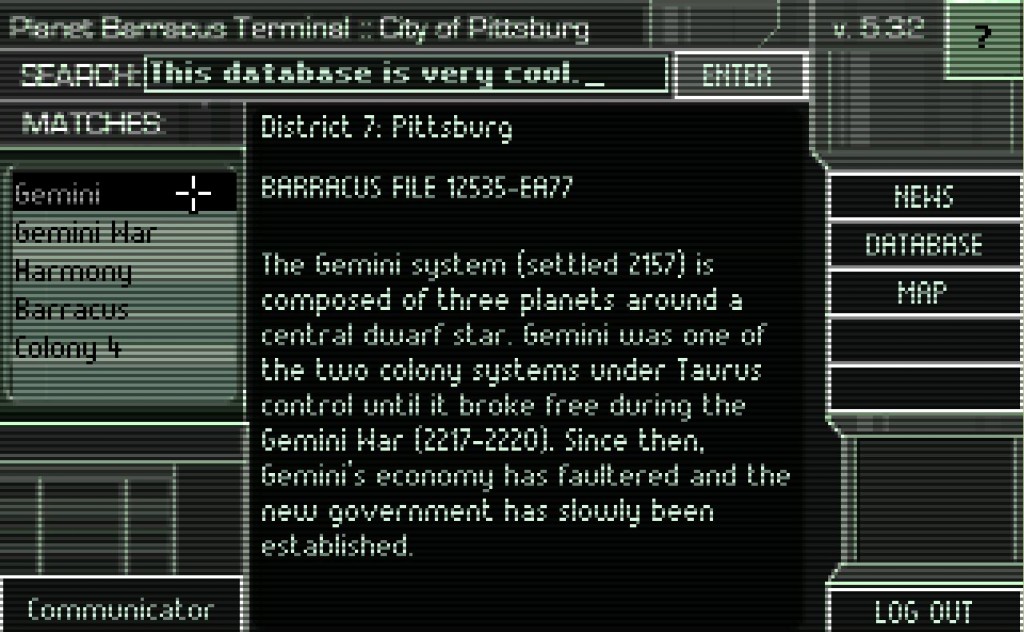
There was nothing to take me out of the game long enough to realize that this wasn’t a big-budget 50-hour RPG, but one guy’s student project that turned into a full-blown game that could be completed in two or three sittings if you knew what you were doing. A few lines of dialogue almost broke me out of the moment because of a particular word choice or vocal inflection, but the dialogue was otherwise very solid. Not once did I get caught up on a bad control scheme or obtuse puzzle and think, “Oh, right. I’m playing an adventure game.” Not once did I have to disguise myself using a mustache made from maple syrup and cat fur.
Adding to the immersion factor was the fact that, throughout much of the game, I was able to switch between Azriel and Delta-Six at will. This was spiffy because I could change characters whenever my curiosity about who this Delta-Six person was got the better of me, or I got sick of sterile white walls and wanted to play in the rain, or I needed time to mull over a puzzle with one character that was starting to give my brain a wedgie.
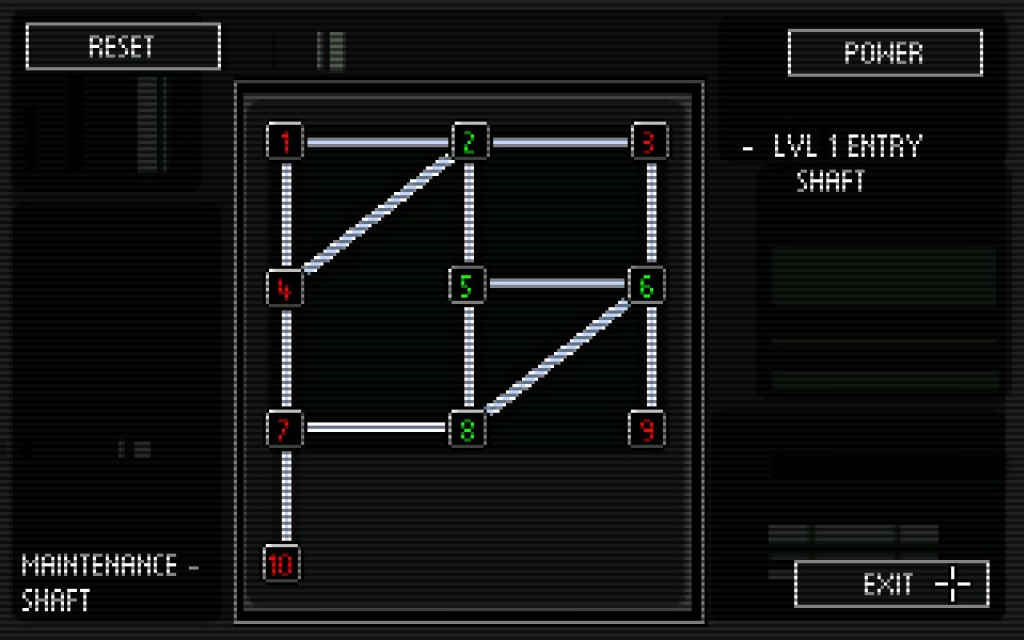 Two screenshots of computer screens in a row? Somebody should fire the screenshot guy.
Two screenshots of computer screens in a row? Somebody should fire the screenshot guy.
Gemini Rue‘s puzzles are usually focused on interacting directly with your environment and doing things in the proper order (which is a little like Hamlet) and using NPCs as though they are items to hack into computers and push heavy objects around (which is awesome). This makes for some incredibly intuitive puzzles, because the average player is more likely to have an idea of what to do with his own body parts and a gun than a pile of prosthetic skin and a manhole cover. This also makes for a few overly straightforward puzzles later in the game that feel a little more like a chore than a challenge. (“Hey, Delta-Six, could you replace these broken pipes with easy-to-obtain new pipes using the wrench in that obvious cabinet over there?” comes to mind.)
Fortunately, the necessary in-game tutorials never felt like a chore. Gemini Rue features some tense action sequences where people with guns shoot at other people with guns, but combat involves reloading and hiding behind cover, which requires some explanation. Cleverly, the plot gives the game excuses to deliver brief tutorials whenever the need arises. For example, being the proud owner of a freshly-wiped memory, Delta-Six has to be taught about everything from the very beginning…starting with firearms training. I seem to recall rainbows and dinosaurs as the first things I ever formally learned about, but I’m glad to see someone has their priorities straight.
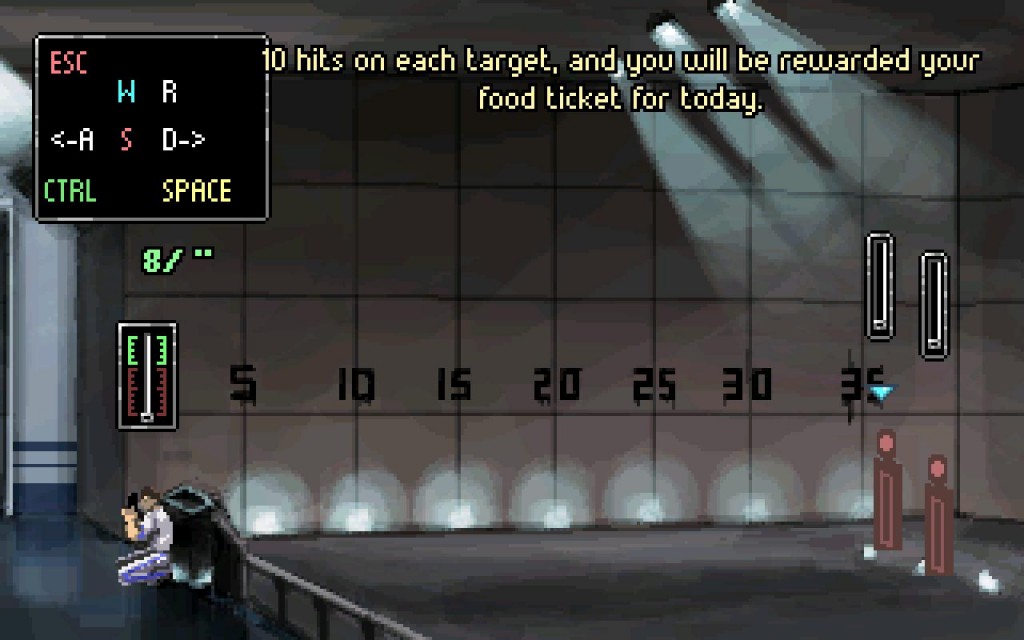 Will shoot cardboard targets for food.
Will shoot cardboard targets for food.
It was very clear that the developer knew exactly how to craft an adventure game. Gemini Rue was deep, engrossing, clever, and challenging without being frustrating, but most of all, FUN. Futhermore, all the evidence suggested that Gemini Rue had a big enough universe to allow for a planet-hopping escapade that would eventually connect the stories of these two protagonists, and that there might even be some certain actions and decisions ahead that could have a huge impact on the direction of the plot—Delta-Six, for instance, seemed to be heading toward a loyalty decision of which one of his fellow rehabilitation center patients he was going to side with, or whether he would attempt to escape alone. Based solely on what I had seen so far, I genuinely thought I was playing KotOR: The Not-Related-to-Star-Wars Adventure Game.
The potential of Gemini Rue was staggering to me, but after an action-packed escape sequence with Azriel (one of my new favorite videogame sequences ever), I was let down hard. I thought that this action sequence would launch the main storyline and take me to another planet…but it instead plopped me back down in the same neighborhood I had just escaped from. I hoped that this was just a minor delay, that I’d be blasting off to a space station or Colony 4 in no time, but the longer I played, the more I started to fear that I was never going to leave the areas I’d already been.
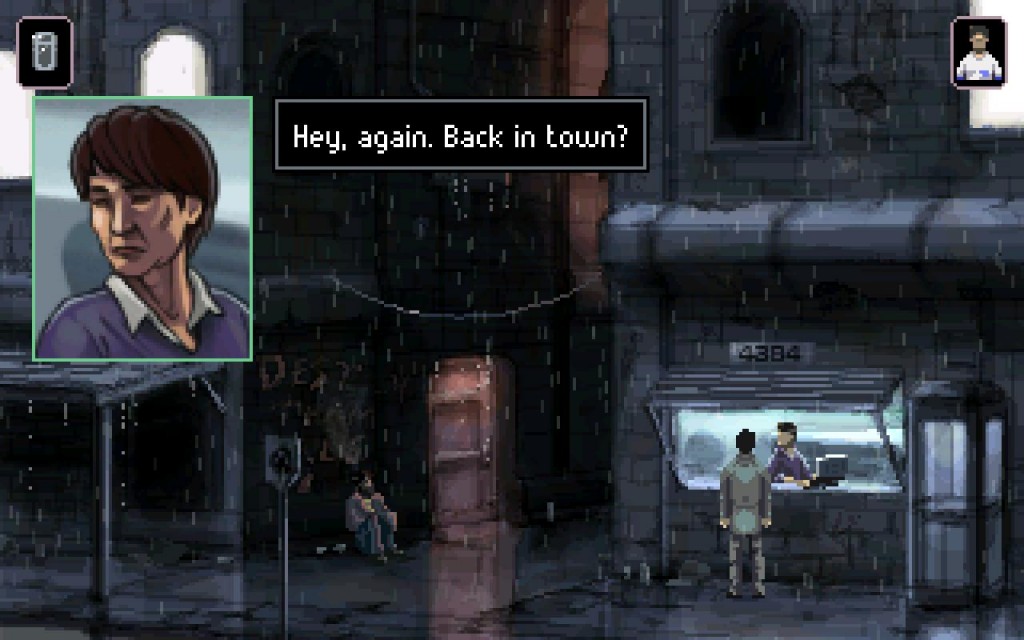 YES! Don’t rub it in.
YES! Don’t rub it in.
That sensation of open-endedness diminished to a thick line with a few branches that always curved back in. The game was still headed in a good direction, just not with all the options and possibilities I had hoped for. Yet, saying that Gemini Rue wasn’t living up to its full potential is like saying an awesome cheeseburger isn’t living up to its full potential as an awesome cheeseburger with milkshake and fries.
Let me say this now: Gemini Rue is still one of the best adventure games I’ve ever played, and not just because I mistook it for a relative of one of my all-time favorite games. It’s just that I should know better than to assume I know exactly what a game is going to be like when I haven’t even bothered to read a real description of it. That’s why the 2007 Simon Pegg/Nick Frost film Hot Fuzz was initially so strange and intolerable to me—some friends dragged me into it without explaining the premise or who this “Simon Pegg” person was, and it wasn’t until an old lady got kicked in the face halfway through the film that I realized it was a comedy, and then I loved it.
And now I sound like a horrible person.
The first quarter of Gemini Rue stands out as perhaps the most perfect videogame experience I’ve ever had, and the story, dialogue, voice acting, sound, and visuals throughout the remainder of the game are every bit as good, if not better—as an interactive story, Gemini Rue is among the finest I’ve ever seen. As an adventure game, Gemini Rue was highly satisfying but left me wanting a little something more, even without my misguided expectations. There was never anything wrong with the game—even the most tedious, rehashed, and/or lackluster puzzles were never any less interesting than your average adventure game puzzle (though I’m not sure whether that speaks well of Gemini Rue or poorly of the adventure game genre)—but there was room for a few things to be more right.
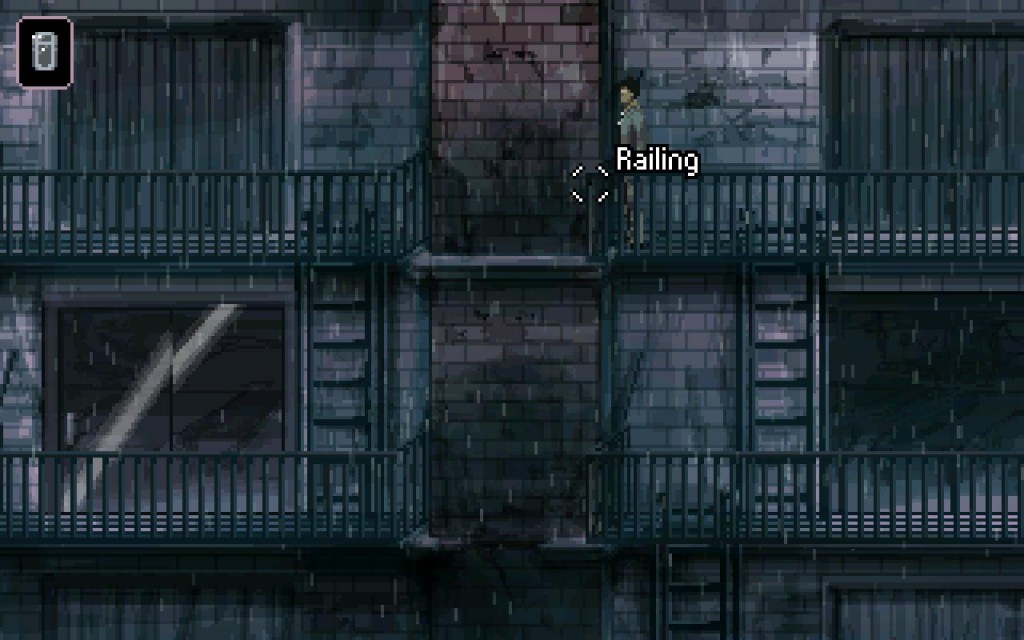 For example, a gunfight or chase sequence here would make this the ultimate “climb over the railing” puzzle.
For example, a gunfight or chase sequence here would make this the ultimate “climb over the railing” puzzle.
The one issue that succeeded in taking me out of the moment is the lack of danger outside of combat situations. When you get into a gunfight, you’ve got a limited amount of ammo, and if you get shot too many times, you die, and then restart at a recent autosave. Just like in real life. However, it eventually becomes clear that there’s no real danger outside of getting shot. I’m not suggesting the game should be as perilous as Space Quest and offer a way for Azriel and Delta-Six to get blown up, eaten, or sucked out an airlock on every street corner, but the story loses a little bit of its oomph when “this building is about to explode” really means, “we’re going to keep doing this neat screen-shaking special effect until you figure out how to escape.”
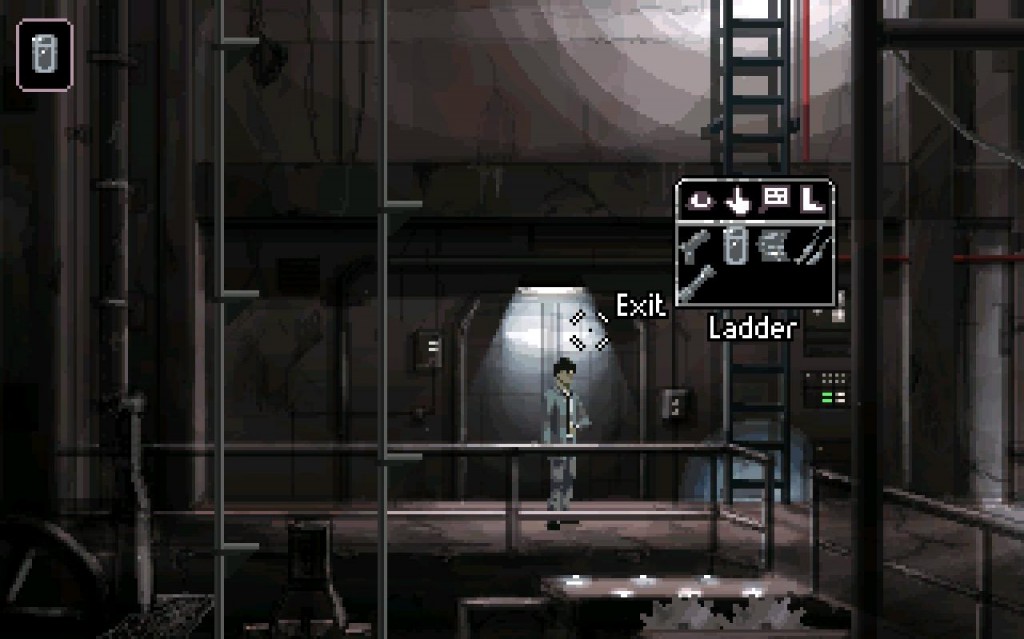 The screen-shaking effect doesn’t translate well into screenshot format. Maybe if you jostle your monitor.
The screen-shaking effect doesn’t translate well into screenshot format. Maybe if you jostle your monitor.
Though the very end of the game managed to recapture some of the initial mystery about whether both success and failure were possible at some plot-critical moments, there were still a number of times throughout the middle of the game when I found it difficult to suspend my disbelief at something that should have killed me by now, or should have at least refused to talk to me any further and forced me to find an alternate solution. (“Heeeeey Kenneth! Pick up the phone one more time as I tell you everything you don’t want to hear!”)
I also found it difficult to suspend my disbelief after learning that everyone in the galaxy who I ever needed to track down and interrogate lived in one of two buildings that were virtually across the street from each other. It’s a blessing and a curse that Gemini Rue was so conscious of reusing backgrounds and locations to keep production time and costs down—while it demonstrates once again that the developer knows exactly what he’s doing when it comes to making a game, just one or two more screens (or one less reason to backtrack somewhere) would have helped the game’s resource-conscious nature from showing through too much. But hey, I enjoyed Muramasa: The Demon Blade despite endless backtracking and frequently reused backgrounds, and Gemini Rue isn’t nearly as bad as that if you break up the game into smaller sessions and don’t immediately play through it again after beating it just so you can write a more informed review.
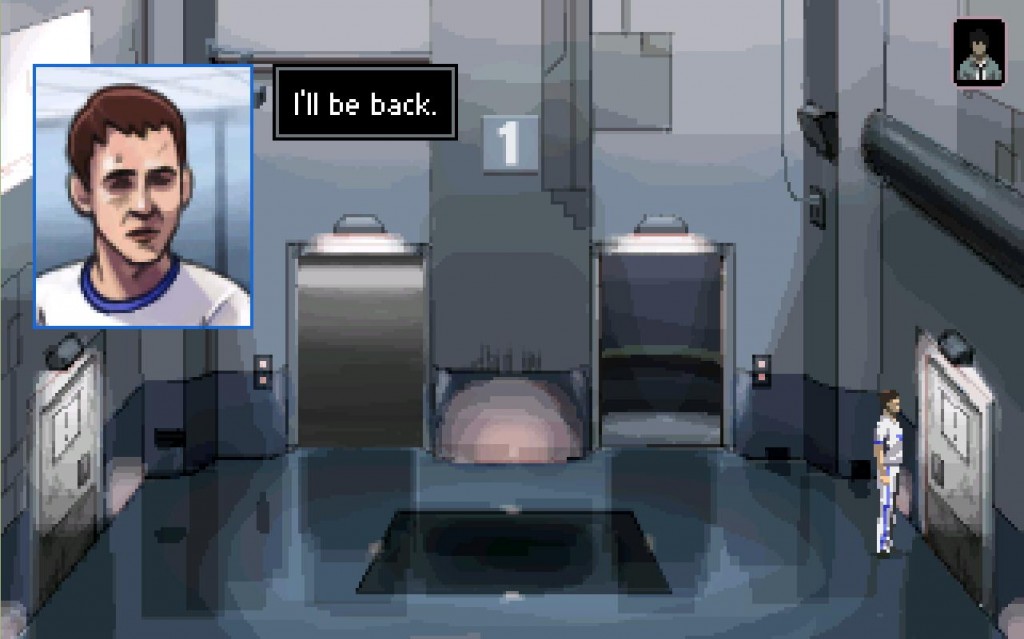 Yeah, probably.
Yeah, probably.
As far as replayability goes, Gemini Rue is worth a second playthrough to try out whatever alternate puzzle solutions and dialogue options you didn’t use the first time around, and to experience the story in a totally different way once you know everything that’s going to happen. You can adjust the difficulty setting on the gun combat, so that adds a little something, and there are a few Easter Eggs and hidden items (specifically, secret notes and extra ammo clips that I was completely oblivious to) that are worth looking for. My favorite feature is the ability to replay the game with developer commentary and voice acting bloopers—clickable “commentary nodes” appear on certain screens, and the insight and laughter they deliver would be worth the price of admission alone, if the rest of the game weren’t already worth the price of admission.
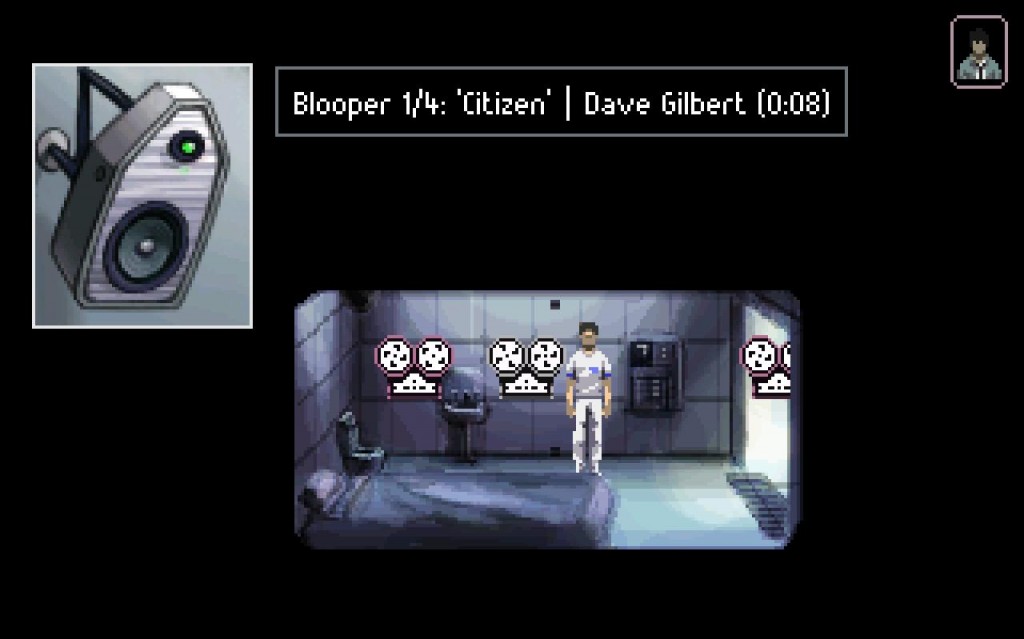 I often have nightmares about waking up to find commentary nodes floating over my bed.
I often have nightmares about waking up to find commentary nodes floating over my bed.
I’ll say it again: Gemini Rue is one of the best adventure games I’ve ever played. The puzzle challenges are generally enjoyable and astoundingly intuitive, and even the ones that aren’t as exciting, fun, or satisfying are at least on par with those of any other adventure game you’ve ever played. The solid design philosophies of a talented developer, the elegantly retro visual presentation, the outstanding voice acting, the perfectly atmospheric music and sound, the tense combat sequences, the funny and insightful bonus commentary, and the well-developed story with its gleefully brilliant plot twists leave me with nothing of any value to complain about, and I am very good at complaining. Even the parts that leave me wanting more only demonstrate how this fantastic game could be more fantastic.
 I figured you could use a little space between these two paragraphs.
I figured you could use a little space between these two paragraphs.
Gemini Rue has successfully joined my Top 5 Favorite Adventure Games club, added a few more “all-time favorite videogame moments” to my list, gotten me interested in other releases by Wadjet Eye Games, and guaranteed that I will buy whatever developer Josh Nuernberger puts out next, even if it’s a line of trendy party hats.
I extend my thanks to Josh and the Wadjet Eye team for the review copy, this excellent game, and the awesome e-mail support along the way! I also thank you, loyal reader, for making it all the way to the end of this lengthy review without passing out or…oh, shoot. I’ll grab the smelling salts.

Seems like a pretty cool game; reminds me of that space game that was released in the 1990’s for the PC that I can’t remember the name of. :O
And well it should, John. And well it should.
I really wish I could remember it; it was like a scenario-based game where the game ends if you make the wrong choice, and you could wander around Earth finding aliens in a bar. Confound it, though, I can’t remember the name!
Just a hunch, are you referring to The Space Bar, by any chance John?
I took a look at the game on YouTube, Matt, and unfortunately, that isn’t the game. I wish I could describe it better; I can visualize a couple of the images in my head, but putting it into words is another story. :/ Ah well.
That’s cool. If you ever find the words to describe it, I’ll try to help.
One of my friends insists that there’s a Master System platformer with a very Abe-styled main character, traversing through what looks like the wild west. He insists that I have also played that game and shown it to him before, but I am none the wiser.
It’s fun trying to work out what games people are on about, even if you so totally get them wrong (like I just did).
Agreed. It makes the discovery all the sweeter, should it ever take place. And it’s always fun to discuss games.